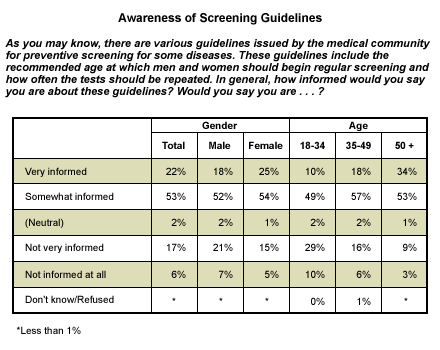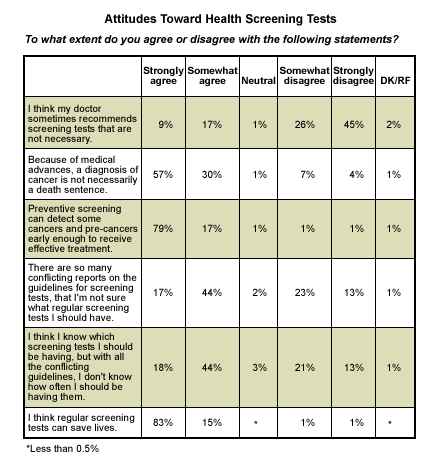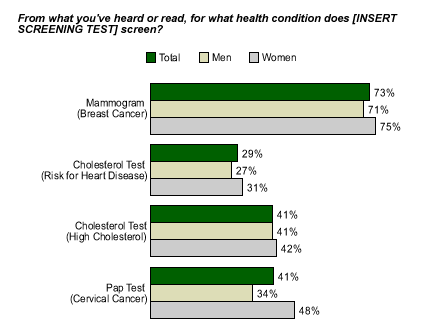Medical screenings save lives. This is a lesson many continue to learn in the most wrenchingly painful way possible -- by losing a loved one to cancer or other serious illnesses, or by being diagnosed with an illness that could have been detected earlier with the proper screening.
One of the most famous champions of such preventative care is Today's Katie Couric, whose husband died from colorectal cancer in 1998. Couric's message is clear -- her husband's death could have been prevented if he'd had the proper health screening. Indeed, since Couric's on-camera colonoscopy and subsequent crusade on the subject, a University of Michigan study shows colonoscopy testing in the United States has increased 20%. Still, the American Cancer Society estimates that in 2004, the number of new cases of colon cancer will be 106,370.
Given the importance of screening and prevention, how many Americans know about screenings, how many are being tested, and how do they feel about preventative health screenings? These and other questions were addressed in a recent Gallup survey* conducted for the College of American Pathologists.
Screenings
The results suggest that many Americans feel informed about various health screening test guidelines. Seventy-five percent of Americans feel they are "informed," with 53% saying they feel "somewhat informed" and 22% saying they feel "very informed." As Americans age, their awareness of screening guidelines increases -- 59% of those aged 18 to 34 say they are informed, compared with 87% of those aged 50 and older. The numbers who are "very informed" rise dramatically with age -- only 10% of 18- to 34-year-olds feel this informed, compared with 34% of those 50 and older.

Respondents were also presented with a list of five types of medical screening -- for cervical cancer, breast cancer, cholesterol, colon cancer, and prostate cancer -- and asked with which of the associated screening guidelines they were most aware. The results for men and women are quite different. Among women, 58% claim greatest awareness of breast cancer screening guidelines, with cervical cancer a distant second at 20%. Among men, prostate and cholesterol screening score highest, with 33% and 30%, respectively, claiming greatest awareness of these guidelines.
Attitudes About Health Screenings
Virtually all adults surveyed (98%) believe that regular health screening tests can save lives, and nearly 9 in 10 agree that a cancer diagnosis is not necessarily a death sentence, thanks to medical advances. But there are barriers to screening, with 6 in 10 Americans agreeing that because of the conflicting reports on guidelines, they are not sure what tests to have or how often to have them.

Awareness of Screening
Three-fourths of women (75%) know that a mammogram tests for breast cancer. Yet another basic test for women, the Pap test, is not as well understood. While 94% of women say they have had a Pap test, only 48% know that a Pap test specifically screens for cervical cancer.

The good news is that many Americans -- particularly older Americans -- are getting screened for at least some serious health conditions. Nearly all of the women surveyed (94%) report having had at least one Pap test. Somewhat fewer women report having had a mammogram (74%). About half of adults (55%) say they have their cholesterol checked once a year or more often. Slightly more than a quarter (27%) say they've had colon cancer screening -- the percentage rises to 54% among those aged 50 and older. And 37% of men report having been screened for prostate cancer. Again, the percentage rises rapidly with age -- to 71% among those 50 and older.
The bad news is that some Americans place a low priority on preventative screening. When asked what their main reason was for putting off or not getting regular screening tests, 14% say that they are too busy, 11% say that they can't afford it or have no insurance, and 10% simply assume they are healthy.
Bottom Line
Doctors play a central role in disseminating information about preventative screening. When asked the main source of information about health screening, 51% of adults cite their general practitioner, physician, internist, or gynecologist. While both men and women mention a doctor as the main source of information about screening, women are more likely than men to cite a physician (62% vs. 38%).
The survey results point to a need for more clear, simple information about the types of screening available, the ages at which screening is recommended, and the suggested frequency of such tests. But Americans -- especially men -- must hold up their end of the bargain by going to the doctor annually, not only when they are sick.
*Results are based on telephone interviews with 1,498 national adults, aged 18 and older, conducted Nov. 14-Dec. 18, 2003. One can say with 95% confidence that the maximum margin of sampling error is ±3 percentage points.